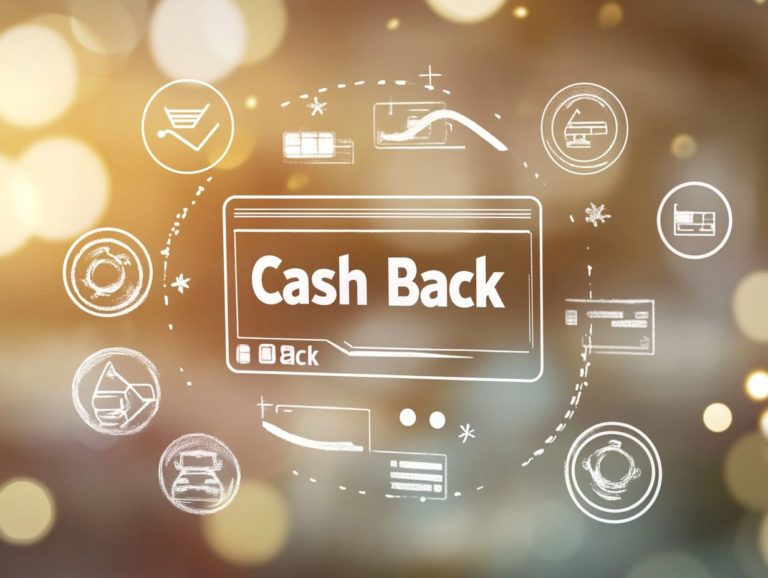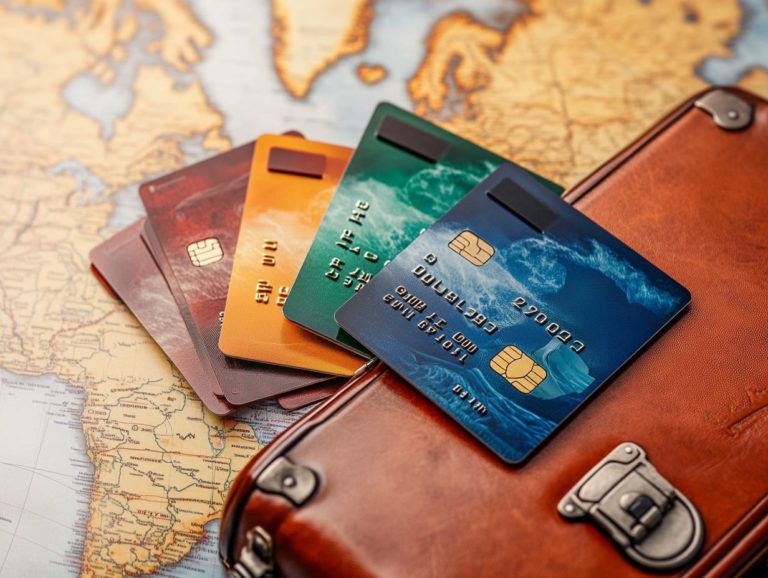The Impact of Cash Back on Your Budget
Cash back programs are gaining traction. They present you with an opportunity to earn money back on your everyday purchases.
But what exactly is cash back, and how does it work?
This article explores the advantages of using cash back rewards. These rewards range from saving money to improving your credit history.
You’ll find strategies to maximize your cash back rewards. We also examine important factors like eligibility, interest rates, and fees.
Get ready to supercharge your budgeting skills!
Contents
- Key Takeaways:
- Understanding Cash Back
- Benefits of Using Cash Back
- Factors to Consider Before Using Cash Back
- Maximizing Cash Back Rewards
- Alternatives to Cash Back
- Frequently Asked Questions
- What is the impact of cash back on your budget?
- How does receiving cash back affect your spending habits?
- Are there any downsides to using cash back programs?
- How can cash back help with budgeting for special occasions?
- What are some tips for maximizing cash back rewards?
- Can cash back programs impact your credit score?
Key Takeaways:

- Cash back lets you earn money back on your purchases.
- It can help you build credit and enjoy perks like travel benefits.
- Consider eligibility, rates, and fees before choosing a cash back card.
Understanding Cash Back
Grasping the concept of cash back is crucial for anyone aiming to improve their financial plan and refine their budgeting strategy. It allows you to earn a percentage of your spending back through various credit card rewards programs.
By using cash-back cards, you can significantly boost your savings. This encourages responsible credit card usage, ultimately enhancing your credit score over time.
What is Cash Back?
Cash back is a rewards program offered by credit card issuers. It gives you a percentage of your purchases back, often as a statement credit or a deposit into your account. This incentive encourages you to use your credit card instead of cash or debit for everyday transactions.
Essentially, cash back helps you manage your finances more effectively by rewarding you for your typical spending. You can also consider using cash back for holiday shopping to maximize your rewards. Plus, various budgeting apps can help you track these rewards easily.
As you explore different types of cash-back cards, you’ll find options tailored to your specific spending patterns. Some cards offer higher cash-back percentages for groceries, while others cater to travelers or dining enthusiasts.
This specialization helps you align your card usage with your spending habits, enhancing your budgeting efforts. Many of these cards also provide tools that allow you to visualize your spending and savings.
Cash-back incentives not only present opportunities for savings but also encourage smart spending. This fosters a more thoughtful approach to personal finance.
How Does it Work?
Cash back allows you to earn a percentage of your spending back on eligible purchases. This typically ranges from 1% to 5%, depending on your credit card and specific spending categories.
To truly reap these rewards, be mindful of any spending limits tied to your card. Some cards offer enhanced cash-back rates in categories like groceries, gas, or dining, but they may impose a cap on the amount eligible for those higher rates.
Keeping track of your expenditures is essential. If you regularly record your transactions, you can pinpoint which spending categories yield the best rewards.
By strategically aligning your purchases with those lucrative categories, you can significantly boost your cash-back earnings. Staying organized and attentive to your financial habits is key to maximizing those rewards.
Benefits of Using Cash Back
The advantages of using cash back are numerous. You can save money on your everyday purchases while promoting smart spending habits.
This approach not only boosts your immediate savings but also fosters long-term financial benefits that can enhance your overall savings over time.
Saving Money

Cash-back rewards help you save money on your purchases, which lowers your overall expenses and improves your monthly budget. Understanding the impact of credit card features on your budget can further enhance your financial planning.
This creates a compelling cycle where financial benefits accumulate over time. You can direct those savings toward essential areas like debt payments or unexpected expenses.
Imagine a family using a cash-back credit card for their monthly grocery shopping. If they funnel the cash back they earn around $200 annually toward their outstanding credit card balance, they reduce their debt and decrease interest payments in the long run.
Real-life case studies show how families can save thousands over the years with cash-back programs. This significantly aids their budgeting efforts and enhances their financial peace of mind.
Building Credit
Using cash-back cards responsibly can be a smart move in building your credit score. By making timely payments and keeping your credit use low, you ll see positive results in your credit profile.
Integrating these cards into a well-thought-out budgeting strategy lets you enjoy rewards without accumulating debt. One effective approach is the envelope system, where you allocate specific amounts for each spending category.
This keeps you within your limits and ensures you can pay off the balance each month. Maximize your rewards while sidestepping interest charges.
You can boost your credit score by leveraging automatic payments. This ensures that your bills are paid promptly. With careful tracking and mindful spending, enjoy the perks of cash-back rewards while reinforcing your financial health.
Additional Perks
Along with cash-back earnings, many cash-back cards come loaded with enticing perks like travel rewards, purchase protection, and convenient opportunities to redeem rewards through budgeting apps.
These additional benefits can significantly boost the overall value of the card. It s an excellent choice for frequent travelers seeking discounts on flights and accommodations.
Don t miss out! Enjoy features like extended warranty coverage and price protection that safeguard your purchases and ensure you snag the best possible deals.
Effectively redeeming your rewards often requires a bit of strategic planning. Align redemption periods with favorable travel deals or holiday promotions to maximize those savings.
While some cash-back cards might carry annual fees, the value from these perks can often far exceed the costs, especially for those who know how to wield their rewards wisely.
Factors to Consider Before Using Cash Back
Before you commit to a cash-back card, weigh several key factors. Consider the eligibility requirements, interest rates, and any potential fees tied to the card, as these elements can greatly influence your financial strategy.
Making an informed choice can enhance your rewards while minimizing hidden costs.
Eligibility and Requirements
Eligibility for cash-back cards depends on several key factors, including your credit score, income level, and the specific requirements set by the credit issuer.
Some cards target particular demographics, such as students or frequent travelers. These may demand even more specific qualifications.
To ensure you meet these criteria, consider leveraging budgeting apps. They can be incredibly helpful.
These digital tools enable you to assess your financial health by tracking your spending patterns, fluctuations in income, and overall budgeting efforts.
By utilizing these resources, you gain a clearer picture of your current financial standing. This ultimately guides you toward selecting the most suitable cash-back card tailored to your lifestyle needs.
Interest Rates and Fees

Understanding interest rates and annual fees tied to cash-back cards is essential. These costs can overshadow the advantages of cash-back rewards if not managed wisely.
When evaluating a cash-back card, consider how high interest rates might erode the value of the rewards you earn from everyday purchases. It s easy to get swept up in the excitement of earning cash back, but that often leads to overspending. This is where your money management comes into play. Developing a thoughtful financial plan can help you avoid accumulating debt that outweighs any potential rewards.
Paying attention to late fees and fully understanding the card’s terms helps ensure that the value you get from cash-back programs remains positive. Use your card wisely to truly enjoy the perks!
Maximizing Cash Back Rewards
To truly maximize your cash-back rewards, consider employing strategies that emphasize a clear understanding of your spending limits.
By utilizing cash-back apps, you can effectively track your purchases, making the most out of every transaction.
Strategies for Earning More
Implementing strategic spending techniques can greatly enhance the amount of cash back you earn. Focus on cash purchases and make the most of budgeting apps.
By adopting a mindful approach to your spending habits, you can leverage cash-back programs more effectively. One effective strategy is to prioritize cash for your everyday purchases, as some rewards programs provide additional bonuses for transactions made with physical currency.
Integrating budgeting apps allows you to track your expenses and set reminders for spending limits. This ensures you maximize cash-back categories without overspending. By regularly reviewing cash-back offers and aligning your purchases with promotional periods, you can optimize rewards and make informed financial decisions that significantly boost your overall savings.
Alternatives to Cash Back
While cash-back rewards have their appeal, consider exploring several enticing alternatives. Various rewards programs offer a range of benefits and incentives for consumers keen on maximizing their earnings through different payment methods.
Comparing Different Rewards Programs
Comparing different rewards programs enables you to pinpoint which options yield the best return on your spending. Consider crucial factors like interest rates and annual fees.
By analyzing various programs, you can uncover unique features that resonate with your purchasing habits and lifestyle preferences. Some programs may offer higher rewards for specific categories, such as dining or travel, while others might provide a flat-rate cash back on all purchases. It s essential to understand the pros and cons of each program; for example, a card boasting an attractive sign-up bonus might be countered by a hefty annual fee.
Ultimately, choosing the most suitable rewards program requires thoughtful evaluation of your personal financial goals. Whether you aim to maximize travel benefits or minimize costs, ensuring that you can leverage rewards effectively will enhance your overall spending power.
Frequently Asked Questions

What is the impact of cash back on your budget?
The impact of cash back on your budget can be significant. It allows you to earn money back on purchases you make. Understanding the impact of rewards cards on your budget can help you determine how this extra cash can supplement your budget or help save for future expenses.
How does receiving cash back affect your spending habits?
Receiving cash back can positively impact your spending habits. It encourages you to make purchases that result in cash-back rewards, which can lead to more mindful spending and help you stick to your budget. Understanding the role of cash back cards in financial planning can further enhance your financial strategy.
Are there any downsides to using cash back programs?
Cash back programs can save you money, but they come with some downsides. Some may charge annual fees or require a minimum spending amount, so be sure to read the fine print!
How can cash back help with budgeting for special occasions?
Cash back is great for budgeting during special occasions like holidays or birthdays. You can use your rewards to cover gifts or special purchases, keeping your budget intact without compromising on quality or thoughtfulness!
What are some tips for maximizing cash back rewards?
To maximize your cash back rewards, plan your purchases carefully. Take advantage of bonus offers and promotions, and use a cash back credit card for everyday expenses like groceries and gas to earn rewards faster!
Can cash back programs impact your credit score?
Generally, cash back programs do not directly affect your credit score. However, always use them wisely. Paying off your credit card balance each month helps maintain a good credit score by keeping your credit utilization low.






